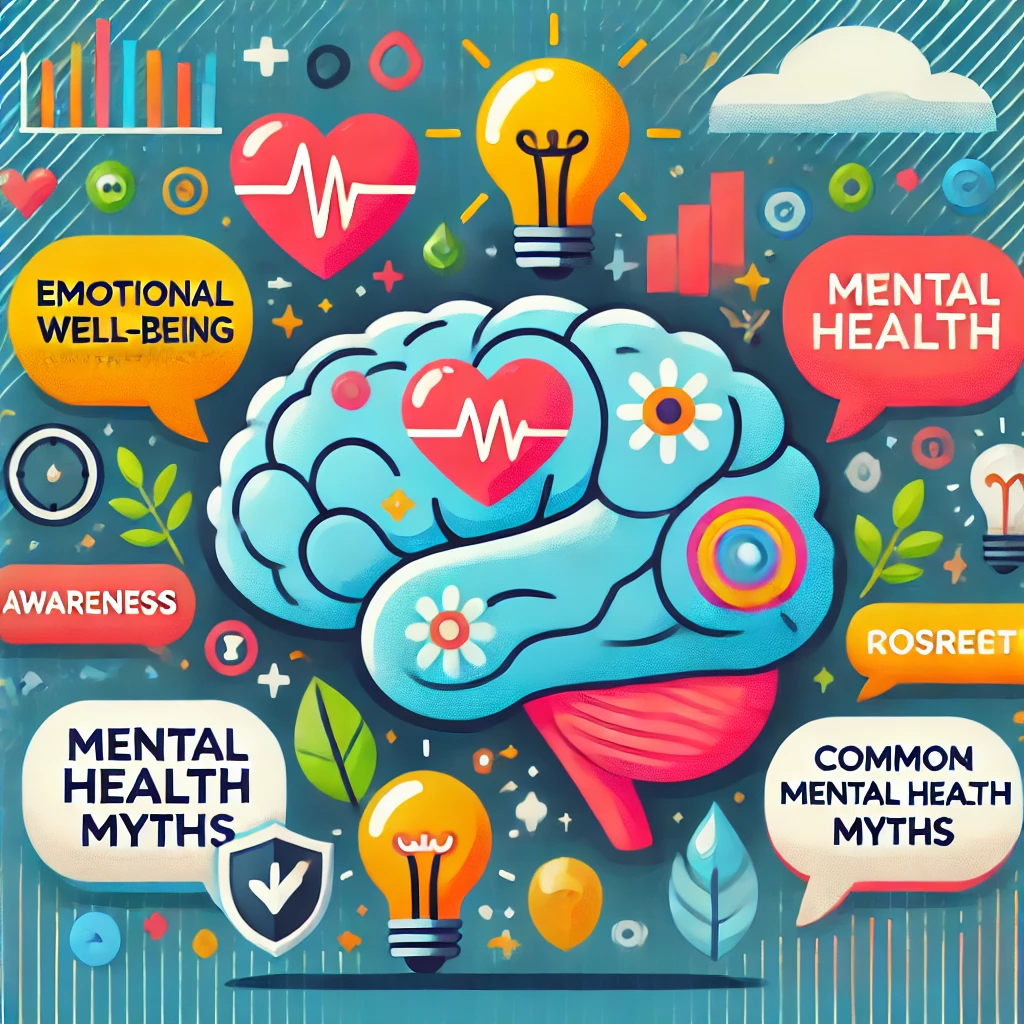Busting Mental Health Myths

When it comes to mental health, there are plenty of myths floating around—some that have been passed down for generations! But here at IDRAAC, we’re all about setting the record straight. So, let’s bust some of the biggest mental health myths and get to the facts!
🚫 Myth #1: "Mental illness is a personal weakness."
✅ Fact: Mental illness is not a sign of weakness—it’s a health condition that can affect anyone, just like diabetes or high blood pressure. If left untreated, it can interfere with your education, work, family life, and even your physical health. Seeking help is a strength, not a weakness!
🚫 Myth #2: "Depression won’t kill me, but high blood pressure might."
✅ Fact: Mental and physical health go hand in hand. Depression can actually contribute to physical illnesses, increasing your risk of heart disease, chronic pain, and more. Prevention and early treatment save time, energy, and even lives!
🚫 Myth #3: "Willpower is enough to overcome mental illness."
✅ Fact: You wouldn’t try to "willpower" your way out of the flu, would you? Mental illnesses require the right treatment, just like any other health condition. The real power comes from understanding mental health and seeking the right support.
🚫 Myth #4: "Memory problems are just a normal part of aging."
✅ Fact: Forgetting where you put your keys? Normal. Forgetting important information consistently? That could be dementia. Memory problems can be part of a real medical condition, and early intervention can improve quality of life.
🚫 Myth #5: "We don’t need local research on mental health; we can just copy what Western countries do."
✅ Fact: Mental health is not one-size-fits-all. Our society has unique challenges and cultural factors that require local research for effective solutions. In fact, global institutions rely on our findings for a better understanding of mental health worldwide.
🚫 Myth #6: "Kids can’t have mental health problems."
✅ Fact: Children can experience anxiety, depression, hyperactivity, and other mental health conditions at any age. Ignoring the signs can lead to long-term struggles, so early intervention is key!
🚫 Myth #7: "Mental illness is rare in Lebanon."
✅ Fact: 1 in 4 Lebanese adults has experienced at least one mental disorder in their lifetime. Mental health conditions are more common than you think, and they do not discriminate.
🚫 Myth #8: "People with mental illness are violent and unpredictable."
✅ Fact: Nope! Studies show that most people with mental illness are not violent—in fact, they are more likely to be victims of violence than perpetrators.
🚫 Myth #9: "Mental illness runs in families, so it’s unavoidable."
✅ Fact: Genetics can play a role, but it’s not the only factor. Environment, trauma, and life experiences all influence mental health. Just because a condition runs in your family doesn’t mean you’ll experience it.
🚫 Myth #10: "Medication alone is enough to treat mental illness."
✅ Fact: While medication can be helpful, it’s not always the full solution. Many people benefit from therapy, lifestyle changes, and social support alongside medication.
🚫 Myth #11: "Mental health problems can’t be prevented."
✅ Fact: Mental health issues can be prevented! Teaching resilience, coping strategies, and emotional intelligence from a young age can reduce the risk of developing mental health conditions later in life.
🚫 Myth #12: "Bad parenting causes mental illness."
✅ Fact: Parenting can be a risk factor, but mental illness is caused by a combination of factors, including genetics and environment. Blaming parents oversimplifies a much more complex issue.
🚫 Myth #13: "Mental health disorders last forever."
✅ Fact: Some conditions require long-term management, but many mental health disorders are temporary and can be successfully treated with the right support.
🚫 Myth #14: "Psychotherapy takes years."
✅ Fact: Modern therapy is short-term and solution-focused. Many treatments only last a few months!
🚫 Myth #15: "Therapy is too expensive."
✅ Fact: Mental health treatment costs are comparable to other medical treatments. Plus, early intervention can save money in the long run!
🚫 Myth #16: "Mental illness and intellectual disabilities are the same thing."
✅ Fact: Mental illness affects mood, thinking, and behavior, but it does not impact intelligence. Intellectual disabilities, on the other hand, affect cognitive functioning.
🚫 Myth #17: "Addiction is just a personal problem."
✅ Fact: Addiction is not just a choice—it’s a complex condition influenced by genetics, environment, and sometimes other mental health disorders. It requires medical and psychological support, not judgment.
🚫 Myth #18: "You can always tell if someone has a mental disorder."
✅ Fact: Many people with mental health conditions look completely fine on the outside. The signs aren’t always obvious, which is why awareness and compassion are so important.
Mental health matters—and so does the truth. Let’s break the stigma, spread the facts, and support those who need it. If you or someone you know is struggling, don’t hesitate to reach out for help!
💬 Join the conversation and help raise awareness!



